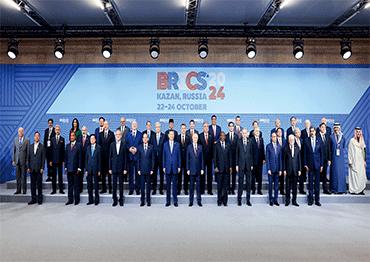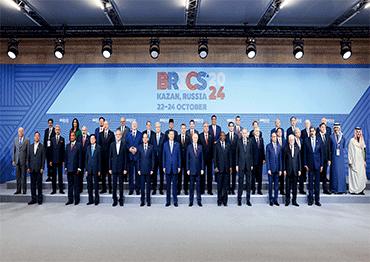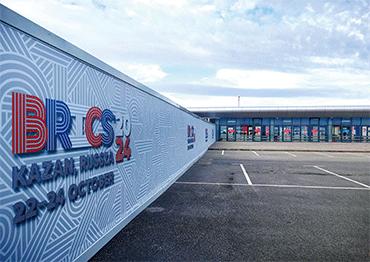During the summit, BRICS countries jointly signed a comprehensive document, known as the Kazan Declaration, detailing their collective vision in 134 points covering issues ranging from geopolitics and economics to the environment and health. Multilateralism, a green transition and fairer world economic and financial system are particularly high on the agenda.
Voicing concerns over “the rise of violence and continuing armed conflicts in different parts of the world,” the document reiterated BRICS countries’ commitment to “peaceful resolution of disputes through diplomacy, mediation, inclusive dialogue and consultations.”
Highlighting “the emergence of new centers of power, policy decision-making and economic growth,” the document stresses that the new realities “pave the way for a more equitable, just, democratic and balanced multipolar world order.”
“We reaffirm our commitment to multilateralism and upholding the international law, including the Purposes and Principles enshrined in the Charter of the United Nations (UN) as its indispensable cornerstone, and the central role of the UN in the international system,” the declaration states.
The BRICS countries are committed to cooperation on greenhouse gas reduction and the carbon market to trade carbon credits, and reaffirm the importance of biodiversity conservation and energy efficiency. They recognize the key role of major multilateral platforms, notably the UN and the G20.
In recent months, a focal point of BRICS development has been on making substantial progress on financial cooperation. After the recent expansion brought in several major oil producers such as Saudi Arabia, Iran and the UAE, BRICS countries now account for more than 40 percent of total global oil output, which substantially increases their influence in energy trading and payment settlements.
The Kazan Declaration calls for “reforming the current international financial architecture” to “make the international financial architecture more inclusive and just.” The document reiterated that the group “welcomes the use of local currencies” between member states and agrees to study the “feasibility” of establishing an independent BRICS cross-border settlement and depository system, and an insurance company.
Established in 2015 by BRICS countries, the New Development Bank admitted four new members, Bangladesh, Egypt, the UAE and Uruguay in 2021. By the end of 2023, the NDB, which is based in Shanghai, has approved 105 projects with a total investment of US$35 billion, according to Xinhua News Agency. The key areas of investment are social and economic infrastructure and sustainable development.
“The New Development Bank should be expanded and strengthened. We must ensure that the international financial system more effectively reflects the changes in the global economic landscape,” Chinese President Xi Jinping said in his speech delivered at the summit on October 23.
The Kazan Declaration also highlighted the importance of the BRICS Contingent Reserve Arrangement (CRA). Set up in 2015, it is a pool of currency swaps that member countries can use to help each other in times of crisis. “We express our strong support for the CRA mechanism improvement via envisaging alternative eligible currencies,” said the document.
“Financial cooperation entities like the NDB and CRA can not only enhance global financial security, but also put pressure on the IMF to further reform its quota system, thereby effectively increasing the financial voice and representation of BRICS and Global South countries,” Wang Youming, a senior research fellow in developing countries at the China Institute of International Studies in Beijing, told NewsChina.
Indian Prime Minister Modi also voiced support for pushing forward financial integration among BRICS countries, saying that India welcomes the use of local currencies and supports strengthening of correspondent banking networks within BRICS. “BRICS has achieved many milestones in the past two decades, and it will emerge as a more effective medium to face global challenges,” Modi said in a speech in Kazan on October 23.
Meeting with journalists after the Kazan Summit concluded, Chinese Foreign Minister Wang Yi said that the summit marked “a new chapter of solidarity and self-strengthening” of BRICS nations and opened up new prospects for development and prosperity of the Global South.

 Old Version
Old Version

